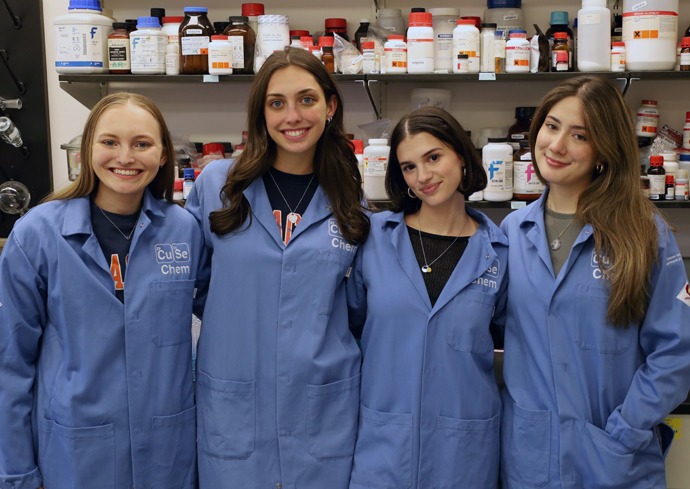When Jesse Buck ’25, Isabella Chavez Miranda ’25, Lucy Olcott ’25 and Morgan Opp ’25 started as student researchers in medicinal chemist Robert Doyle’s lab, they hoped to hone their research skills.
It quickly became evident this would be unlike any other lab experience. The collaborative environment in the Doyle Group cultivated confidence in their abilities and led to constructive conversations about how to achieve the goals of their projects.
As they were producing, purifying, synthesizing and redesigning the peptides that eventually helped lead to Doyle’s breakthrough weight loss and diabetes treatments, they discovered their meaningful interactions transformed them into a family, as well as putting them on a path to becoming scientists.
“They are future stars, an incredible quartet that matches great intelligence with as hardworking of a student group I’ve ever had the privilege to work with,” says Doyle, the Jack and Laura H. Milton Professor and Dean’s Professor of Chemistry in the College of Arts and Sciences.
The quartet will now take the lessons learned and apply them to their master’s and Ph.D. programs at prestigious graduate schools:
- Buck, a medicinal chemistry major (Arts and Sciences) will pursue a Ph.D. in chemistry at the University of California, Berkeley;
- Chavez Miranda, a double major in medicinal chemistry (Arts and Sciences) and business management (Martin J. Whitman School of Management), will pursue a master’s in health administration at the University of Southern California;
- Olcott, a chemistry major (Arts and Sciences), will pursue a Ph.D. in pharmacology at the University of Pennsylvania; and
- Opp, a double major in medicinal chemistry and biology (Arts and Sciences), will pursue a Ph.D. at Yale University.
After spending hundreds of lab hours together, Buck, Chavez Miranda, Olcott and Opp sat down with SU News to reflect on a bond that will continue beyond graduation.
How did you become passionate about this research?
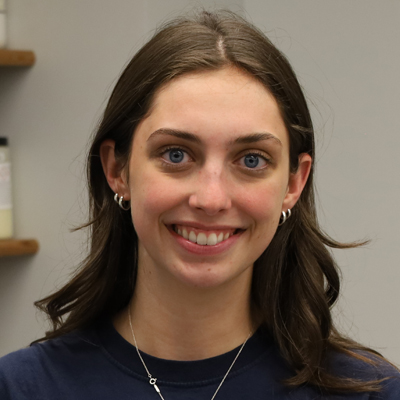
Lucy Olcott: My interest in health science was sparked at 15 when my grandmother was diagnosed with type 2 diabetes. Watching her struggle to adapt to a new lifestyle while managing new treatments opened my eyes to the importance of health care.
After I took Honors General Chemistry with Professor Robert Doyle, the path became clear. The Doyle lab has given me the opportunity to explore translational medicinal chemistry focused on unmet clinical needs of various metabolic diseases.
Morgan Opp: I’ve always had a passion for research that’s translatable, where I can directly see the work I’m doing on a day-to-day basis and how that work has the potential for real-world impact on people who need it. I was in Dr. Doyle’s class freshman year. I knew I liked metabolism and technology, and he took a chance on me and allowed me to begin my research.
Isabella Chavez Miranda: I’ve always had a deep love and passion for chemistry. Both my parents are chemical engineers. Since I was young, I’ve watched them do research. It was a no-brainer that I wanted to be involved when I came to Syracuse.
I was lucky to be in Dr. Doyle’s class my freshman year. He saw the potential in me and allowed me to grow in his lab for the past four years.
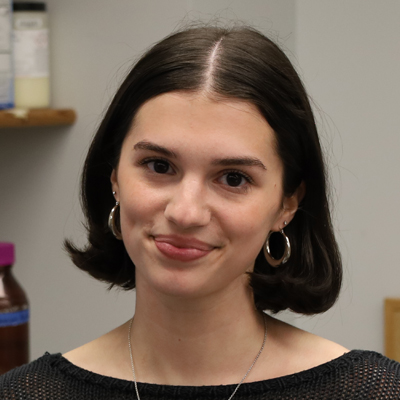
Jesse Buck: I came in as a chemistry major but transitioned to medicinal chemistry and joined this lab as a junior. Dr. Doyle took a chance on me, and I appreciate that because I learned so much about what it means to be in a lab. I love doing chemistry research with implications in biology that you can use to make an impact and create something helpful for patients.
What is your proudest moment/biggest lesson learned from the lab?
Buck: Being accepted into our respective graduate programs. That is concrete evidence that our hard work has paid off. We have an opportunity to grow and become impactful scientists.
Opp: Going to the Mid-Atlantic Pharmacology Society meeting [in Philadelphia, Pennsylvania] with Isa—it’s a big deal for undergraduates to present their research at a national conference like this.
Olcott: Patience in research. It’s easy to get frustrated when experiments don’t go as planned. Being able to identify where things might have gone wrong and go back to the drawing board is just as important as producing and collecting novel data.
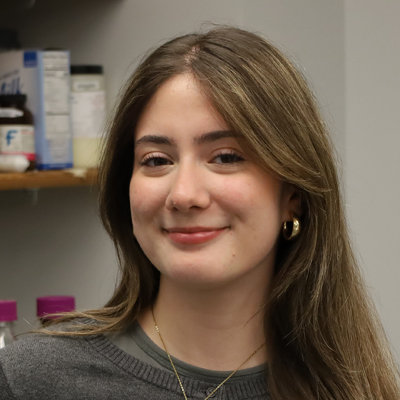
Chavez Miranda: The first time I was able to synthesize a peptide that had the exact correct mass and was usable was an amazing feeling. That showed that I’m learning and growing as a scientist.
How will your graduate work advance your career ambitions?
Chavez Miranda: I’ve loved making these potential drugs that could have a big impact on patients but if the people who need the drugs the most can’t get them, what real value do they bring? I want to bridge that gap between the patients and the drugs they need.
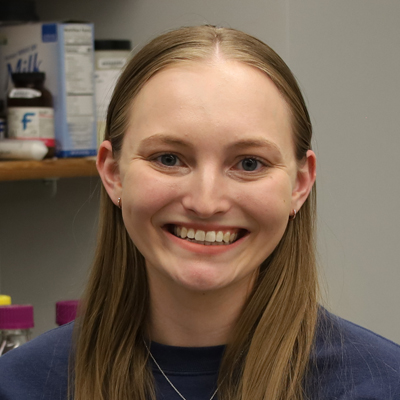
Olcott: I’m interested in pursuing research in drug discovery and development for centrally mediated diseased states and hope to pursue a career in academia as a principal investigator, conducting high-impact research while mentoring the next generation of scientists.
Buck: This is the perfect opportunity to discover what niche I want to work in. I’m hoping to find the perfect lab to mesh my love of chemistry and biology.
Opp: To continue exploring my passion for endocrinology and metabolism. I’m looking at labs that bridge both analytical chemistry, cell biology and medicinal chemistry. I’m leaning toward a future in biotechnology and want to remain on the cutting edge of research.
In case you missed it: Check out episode #175 of the “’Cuse Conversations” podcast, “Striving to Improve the Efficacy of Obesity, Diabetes Treatments.” In the episode, medicinal chemist Robert Doyle discusses his breakthrough weight loss research, the important role students play in advancing his research, and how, through philanthropy, his work has come to life.
